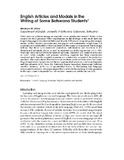English articles and modals in the writing of some Batswana students

View/
Date
2007Author
Alimi, M.M.
Publisher
Multilingual Matters and Channel View Publications, http://www.multilingual matters.comType
Published ArticleMetadata
Show full item recordAbstract
What syntactic patterns emerge in students’ use of articles and modals? What are the
reasons for these patterns? What implications do the findings of the study have for
English language instruction in Botswana? Exactly 1556 essays comprising class assignments,
written seminar presentations, test papers and examination scripts from 514
randomly selected students of the University of Botswana were analysed. The findings
indicate that there were systematic omissions, substitutions and insertion of the
definite
and indefinite articles as well as recurrent use of the expression can be able.
Students’ indication of different forms of epistemic modality was confined to the use
of could while complex verb phrases involving negation had their constituents
reordered
such that the negative operator not consistently succeeded the perfective
auxiliary. The study shows that the reasons for these errors are both intra- and interlingual,
namely the complexities of the two grammatical structures, articles and modals,
and the influence of L1. Since the Botswana Senior Secondary Assessment Syllabus
specifies ‘accuracy’ in the use of grammatical forms, by demanding high language
achievement standards, this paper argues that a return to the teaching of basic grammar
in the high school is important for the students’ mastery of articles and modals
